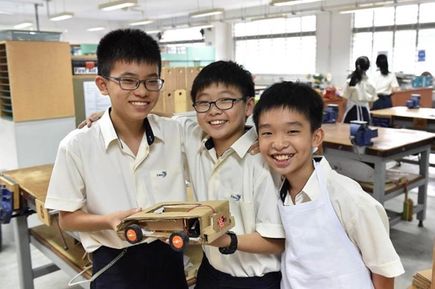Digital Maker Programme
In Singapore, the IMDA developed a programme to introduce micro:bit as a tool to support lessons and extra-curricular activities.

Taking part in the Digital Maker Programme
The Infocomm Media Development Authority (IMDA) in Singapore, in partnership with the Ministry of Education, developed a hugely successful schools programme which has reached nearly every school in Singapore.
In 2014, the “Coding for Fun Enrichment Programme” was a pilot initiated to increase student exposure to coding and computational thinking concepts in primary and secondary schools.
Over the next two years, this programme was rolled out to 34,000 students and included activities for working with microcontrollers.
The Digital Maker Programme (DMP) was then launched in 2017: a 2-year initiative to supply all public schools with 100,000 micro:bits and training, to enable fun and hands-on learning across all subjects. This saw the programme being extended to all primary school levels P1 to P6.
The next phase of the enrichment programme will see new material and information to be released for the academic year 19/20 and rebranded as Code For Fun (CFF). This initiative will seek to develop an appreciation of core computational thinking and coding concepts in pupils through simple visual programming-based lessons.
Programme design
The Digital Maker and Code for Fun implementations were run on a registration basis; schools decide the year or subject group where the micro:bit is introduced.
Participating schools are generally provided with micro:bits to deliver the programme (c.300 – 400 per school). Devices are made available at schools on a rotation basis across class groups each term or through specific subjects e.g. design & technology lessons or through applied learning programmes.
Teacher training at Educator Workshops was run as 1.5-day sessions for up to five teachers per school, including a general introduction to micro:bit and coding, followed by a series of activities, co-created with Microsoft, designed to support teachers as they incorporated micro:bit into lessons.
Through this training, teachers build their capacity to support learners with design and inventive thinking: starting first with a problem statement and empathy, then move on to brainstorming an idea as a solution to the problem, iterating on the idea, followed by testing and collaboration with peers.
This is seen as the main objective in learning with micro:bit: instilling principles of inventive thinking to develop something useful and solving problems, while also inventing for fun.
Impact and results
As of April 2019, 220 schools - 61% of all primary and secondary schools in Singapore - have signed up for the IMDA’s Digital Maker Programme, reaching and benefitting at least 105,000 students.
More than 800 teachers have completed their training at Educator Workshops as they start to integrate digital maker ideas within their subjects.
The expansion of the Code for Fun enrichment programmes from September 2019 onwards will seek to reach the remaining schools throughout Singapore over the next two years.